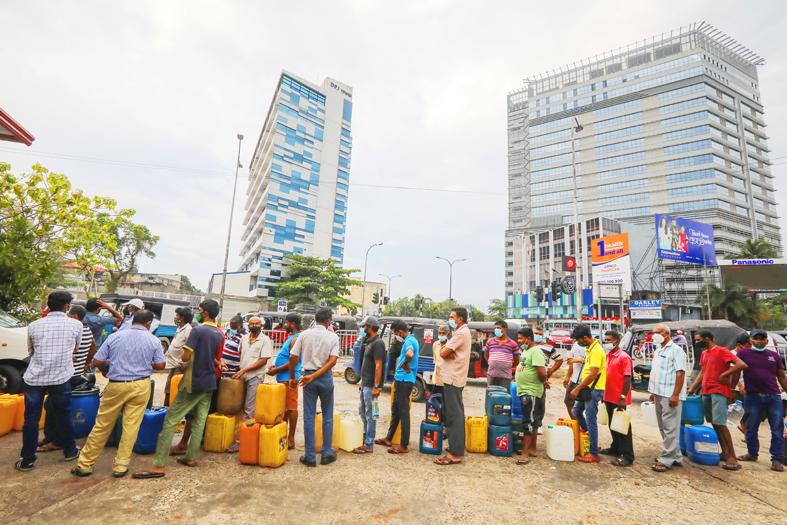The IMF yesterday told Sri Lanka that its foreign debt was “unsustainable,” and called for devaluation and higher taxes to revive the economy.
The COVID-19 pandemic pushed the South Asian nation’s tourism sector — a key foreign-exchange earner — off a cliff, and the government in March 2020 imposed a broad import ban to try to shore up foreign currency.
However, more than two years on, Sri Lanka is grappling with food and fuel shortages, which this week saw its public transport crippled as buses ran out of diesel and the state imposed blackouts.

Photo: EPA-EFE
Following its annual review of the cash-strapped country, the IMF said its fast-dwindling foreign reserves were inadequate to service the country’s current foreign debt of US$51 billion.
Official data show that Sri Lanka needs nearly US$7 billion to service its foreign debt this year, but the country’s external reserves at the end of January were only US$2.07 billion — just enough to finance one month’s imports.
The IMF stressed “the urgency of implementing a credible and coherent strategy to restore macroeconomic stability and debt sustainability,” recommending a return to a “market-determined and flexible exchange rate” — meaning a devaluation of the Sri Lankan rupee.
While the Central Bank of Sri Lanka set rate is 197 rupees to the US dollar, a thriving black market offers 260 rupees for US currency notes.
This disparity has led to a more than 50 percent decline in foreign remittances through official banking channels.
However, the IMF said that the country’s economic woes began before the COVID-19 pandemic.
Soon after taking office in November 2019, Sri Lankan President Gotabaya Rajapaksa cut several taxes nearly in half, the IMF said, driving down government revenue and forcing it to borrow more.
Among recommendations to address the crisis was to raise income taxes and VAT, “complemented with revenue administration reform,” the IMF said.
The lack of US dollars to import fuel has led to an energy crisis.
Besides bringing public transport to a halt on Wednesday, the state’s electricity company also imposed a daily seven-and-a-half-hour electricity blackout — the longest scheduled power rationing in more than a quarter of a century.
Without US dollars to finance essential imports, rice, milk powder, sugar and wheat flour are in short supply, while local industries are unable to bring in raw materials and machinery.
The shortages pushed inflation to 16.8 percent in January — the fourth consecutive record rise — and the IMF said it expected it to remain in the double digits.
International rating agencies have downgraded Sri Lanka over expectations that it might not be able to service its foreign debt, although the government insists that it can meet its obligations.

SETBACK: Apple’s India iPhone push has been disrupted after Foxconn recalled hundreds of Chinese engineers, amid Beijing’s attempts to curb tech transfers Apple Inc assembly partner Hon Hai Precision Industry Co (鴻海精密), also known internationally as Foxconn Technology Group (富士康科技集團), has recalled about 300 Chinese engineers from a factory in India, the latest setback for the iPhone maker’s push to rapidly expand in the country. The extraction of Chinese workers from the factory of Yuzhan Technology (India) Private Ltd, a Hon Hai component unit, in southern Tamil Nadu state, is the second such move in a few months. The company has started flying in Taiwanese engineers to replace staff leaving, people familiar with the matter said, asking not to be named, as the

The prices of gasoline and diesel at domestic fuel stations are to rise NT$0.1 and NT$0.4 per liter this week respectively, after international crude oil prices rose last week, CPC Corp, Taiwan (台灣中油) and Formosa Petrochemical Corp (台塑石化) announced yesterday. Effective today, gasoline prices at CPC and Formosa stations are to rise to NT$27.3, NT$28.8 and NT$30.8 per liter for 92, 95 and 98-octane unleaded gasoline respectively, the companies said in separate statements. The price of premium diesel is to rise to NT$26.2 per liter at CPC stations and NT$26 at Formosa pumps, they said. The announcements came after international crude oil prices

SinoPac Financial Holdings Co (永豐金控) is weighing whether to add a life insurance business to its portfolio, but would tread cautiously after completing three acquisitions in quick succession, president Stanley Chu (朱士廷) said yesterday. “We are carefully considering whether life insurance should play a role in SinoPac’s business map,” Chu told reporters ahead of an earnings conference. “Our priority is to ensure the success of the deals we have already made, even though we are tracking some possible targets.” Local media have reported that Mercuries Life Insurance Co (三商美邦人壽), which is seeking buyers amid financial strains, has invited three financial

CAUTION: Right now, artificial intelligence runs on faith, not productivity and eventually, the risk of a bubble will emerge,’ TIER economist Gordon Sun said Taiwanese manufacturers turned more optimistic last month, ending a five-month streak of declining sentiment as concerns over US tariffs, currency volatility and China’s overcapacity began to ease, the Taiwan Institute of Economic Research (TIER) said yesterday. The manufacturing business confidence index rose 1.17 points from June to 86.8, its first rebound since February. TIER economist Gordon Sun (孫明德) attributed the uptick to fading trade uncertainties, a steadier New Taiwan dollar and reduced competitive pressure from Chinese producers. Taiwan’s semiconductor industry is unlikely to face significant damage from Washington’s ongoing probe into semiconductors, given the US’ reliance on Taiwanese chips to power artificial